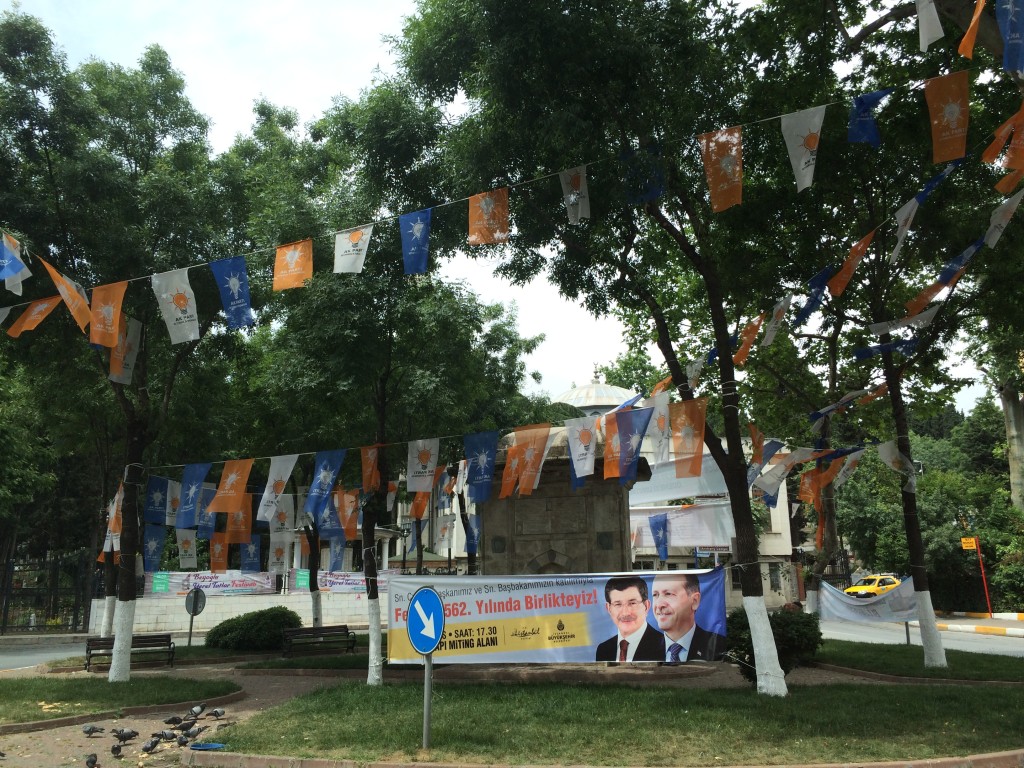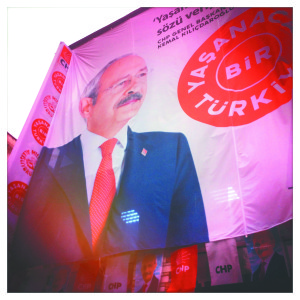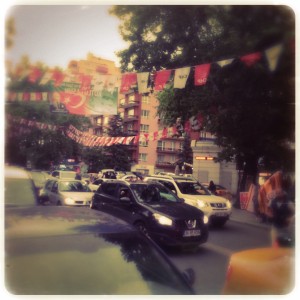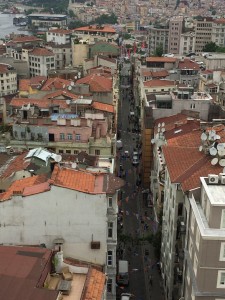As Turkey holds parliamentary elections, a big question marks remains over its future path
ISTANBUL — In the streets of Istanbul, Ankara and beyond, colourful flags hang from above, flapping in the breeze and drawing the eye. They sway insecure in the wind but they are fixed in their allegiances to parties campaigning for votes.
Turkey’s streets have been swamped in these banners for weeks now, but next week they will be taken down. Today, the country heads to the polls, for parliamentary elections of crucial importance. The consequences of the result could reverberate for years to come.
The country’s political system is up for debate. President Recep Tayyip Erdogan, three-time former prime minister and leader of the Justice and Development Party (AKP) until recently, and his party are seeking to change the Constitution to place more power in the hands of the president.
Traditionally, the role has been more like a ceremonial head of state’s, with limited powers. The president has been expected to be neutral, as defined in the Constitution, yet Erdogan has been political, especially in recent months campaigning for his party and Prime Minister Ahmet Davutoglu’s candidacy. He has constantly evoked the Ottoman conquest of Constantinople and warned of the forces of secularism against Islam. At one point he even addressed a rally in Germany, asking resident Turks there for votes.
Erdogan is seen as both controversial and polarizing. He oversaw a long period of economic growth in his 11 years as PM, peaking at more than nine percent in 2010, but now that’s dropped to 2.9 percent, with unemployment hovering around 11 percent. During his years in power, Erdogan has been accused of undermining the secular republic’s roots and trying to influence the media, police and the judiciary.
His railing against journalists —both inside and outside the country — has caught attention during the campaign. He has singled out opposition dailies like Cumhuriyet and Hurriyet and accuses sections of the international media, especially the New York Times, of running a campaign against him. One NGO accused Erdogan of “bullying journalists… because he doesn’t like what they report.” The government has introduced strong rules allowing it to censor and block social media.
Either way, the leader certainly looms large on the streets of Turkey; as much as the flags dominate, Erdogan’s gaze is never far away either.
Critics say he has overstepped his bounds and claim authoritarian tendencies. Erdogan’s defenders in the government, speaking in Ankara this week, said he is seeking to make the presidency more accountable — they dismiss the idea he is seeking more power for himself. The AKP believes a strong executive presidency would be better than the current, “ineffective” system and would allow Turkey to increase its influence globally, officials said.
Either way, the leader certainly looms large on the streets of Turkey; as much as the flags dominate, Erdogan’s gaze is never far away either. Though he is not formally standing this time out, voters know he is key to this election.
Possible outcomes, the Kurdish question
There are three possible outcomes to today’s vote, which will decide the make-up of the 550-seat Parliament. First, Erdogan’s AKP wins a simple majority, a result that would be enough for the party to continue ruling as is, but fall short of giving the president the legitimacy to reshape the country’s politics. Markets generally favour this outcome — the shift to a presidential system would hit a roadblock and there would be continuity in government.
The second likely outcome is vindication for Erdogan and his proposals — an electoral win of 330 seats or more. A large majority for the AKP, one that gives him a three-fifths majority, would give the president the mandate he leads to reform the Constitution and instigate change through a referendum. Securing two-thirds (367 seats or more) would remove the need for a referendum.
Finally, the third option: the ruling party fails to win enough seats and is pushed into a coalition. The far-right Nationalist Movement Party (MHP), led by Devlet Bahçeli, is seen as a potential ally, but the give-and-take of an arranged marriage between parties always produces friction and the MHP is likely to pinch votes from the AKP. Both the main opposition party, the centre-left secular Republican People’s Party (CHP) and the minority Kurdish groups have indicated they would refuse any offer to form a government with the AKP.
All these options however depend, on part, on the performance of the pro-Kurdish Peoples’ Democratic Party (HDP), which is opposed to Erdogan gaining further powers. Their tally of votes will be key.
The HDP has to cross an unusually-high 10-percent threshold, a rule established back in 1980, in order to make it into Parliament. If the party succeeds, it will gain some 50-70 seats. But if it fails, under Turkey’s electoral system, those seats go back in the mix, meaning the AKP would likely end up with an even bigger majority as the largest vote-winner.
Last time out, Kurdish candidates, who mostly stood as independents, took around 6.5 percent according to analysts, but the HDP is hoping to secure a much-larger share of votes after attempting to position itself as a left-wing party for all Turks. The party’s chair, Selahattin Demirtas, has been praised for his campaigning, but needs positive write-ups to translate into votes.
One poll this week indicated that the economic slowdown (though small compared to Europe’s problems as a whole) have turned some voters away from the ruling party, with the AKP falling short of its needed two-thirds majority. Government officials, speaking to Argentine journalists in Istanbul this week, were confident the ruling party would win a majority — the only question, they said, was whether it would be substantial enough.
The HDP has to cross an unusually-high 10-percent threshold in order to make it into Parliament. If the party succeeds, it will gain some 50-70 seats. But if it fails, those seats go back in the mix, meaning the AKP would likely end up with an even bigger majority.
Challenges on the horizon
Like many of its G20 partners, the challenges facing Turkey are numerous. Yet many of them are unique to the country and relate specifically to its location.
The most high-profile issues perhaps are the ongoing tragic conflict in Syria and close by, the related rise and surge of the Islamic State.
The terrorist group, which now occupies key territories in Iraq, is said to be in control of approximately 50 percent of the terrain in Syria. The sheer number of refugees fleeing the conflict has caused problems too.
According to Dr Rahman Nurdun, of Turkey’s Cooperation and Coordination Agency (TIKA), there are now 2.5 million Syrian refugees on Turkish soil. They have been granted residency and the right to work and officials said this week that Turkey is bearing the costs. A noble gesture indeed, but with consequences — reports have emerged this week of unrest in the south, with some citizens unhappy at the massive temporary immigration influx. Some Turks in the south have said they feel they are losing out on jobs, as Syrians will work for much lower wages. The effects of employment are certainly being felt.
Then, there’s the Kurdish peace talks. The disarmament of the Kurdistan Workers’ Party (PKK) has been a major issue during the campaign, as it has for years,and the number of votes won by the far-right, nationalist MHP, in the election may hold considerable sway over this issue. The MHP insists the PKK — considered a terrorist group by the US and Turkey — must disarm of its own accord before any peace talks, and the AKP, which entered tentative negotiations with the PKK three years ago, has become more hardline as the campaign has gone on.
Plenty then remains up in the air. Although the AKP will likely win the election, the number of votes they take, this time out, is more crucial than ever. Turkey, a country which has been the go-between for the West and East for so long is at a crossroads.
@URLgoeshere
Originally published in the Buenos Aires Herald, on Sunday, June 7, 2015.
Link: http://www.buenosairesherald.com/article/191048/erdogan-looks-to-amend-turkish-constitution.




